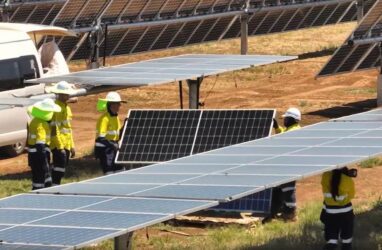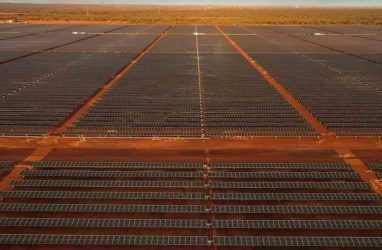Feed aggregator
POLL: Analysts downgrade EU carbon price forecasts on weaker energy, industrial outlooks
Slime after slime: why those biofilms you slip on in rivers are vitally important
Is the UK doing enough to monitor air pollution?
Water metering should be compulsory in England, advisers likely to say
Exclusive: expert panel will tell government there is no other way to manage higher demand as stress on supplies intensifies
Water metering should be made compulsory for all households in England, the government is likely to be told this week, as water supplies come under pressure from increased demand and more frequent droughts and floods.
Strain on the UK’s water networks is increasing under the more extreme weather conditions generated by the climate crisis and, under increasing demand, investment by water companies has not kept up.
Continue reading...The human factor: why Australia's net zero transition risks failing unless it is fair
Dominica’s mountain chicken frog disappears in ‘fastest extinction ever recorded’
Ecological calamity on the Caribbean island demonstrates how quickly wildlife can be destroyed, scientists say
They were once so numerous they were cooked as the national dish of Dominica. Every year, thousands of mountain chicken frogs, roasted with garlic and pepper, were eaten by islanders and tourists.
Two decades later, the animal – one of the world’s largest species of frog – has in effect disappeared from the Caribbean island. A series of ecological disasters has reduced its former healthy, stable population of hundreds of thousands of animals to a total of 21 frogs, according to scientists’ most recent survey.
Continue reading...A ‘whalecam’, seals v sharks and fish that play dead: it’s Planet Earth III
As a new series promises breathtaking footage obtained by groundbreaking technology, children are the new target audience
A detachable “whalecam”, remote underwater cameras operated from a director’s bedroom and a “drone ballet” are among the innovations that will be featured for the first time on David Attenborough’s Planet Earth III.
Following the global success of 2016’s BBC’s Planet Earth II and its famous “snakes v iguanas” scene, the corporation’s natural history unit has spent five years pushing the boundaries of technology to deliver an equally jaw-dropping series.
Continue reading...It’s time for reconciliation to be led by the clean energy opportunity
 We blew it. It’s now incumbent on all in the clean energy sector to find meaningful ways to give voice and genuine partnership to First Nations communities in the clean energy revolution.
We blew it. It’s now incumbent on all in the clean energy sector to find meaningful ways to give voice and genuine partnership to First Nations communities in the clean energy revolution.
The post It’s time for reconciliation to be led by the clean energy opportunity appeared first on RenewEconomy.
Engie and Posco pursue huge green hydrogen project in Pilbara to feed green steel
 Engie and Posco team up again to study major green hydrogen project in Pilbara to supply a green iron facility and potentially green steel.
Engie and Posco team up again to study major green hydrogen project in Pilbara to supply a green iron facility and potentially green steel.
The post Engie and Posco pursue huge green hydrogen project in Pilbara to feed green steel appeared first on RenewEconomy.
Australia’s biggest battery – 2.4GWh – wins federal environmental approval
 The biggest battery project in Australia - just 25 kms from the Melbourne CBD - has gained federal environmental approval.
The biggest battery project in Australia - just 25 kms from the Melbourne CBD - has gained federal environmental approval.
The post Australia’s biggest battery – 2.4GWh – wins federal environmental approval appeared first on RenewEconomy.
Scientists build traps to manage UK’s rising number of Chinese mitten crabs
Voracious, furry-clawed crustaceans are being controlled ‘to protect the environment’
It is classified by conservationists as one of the 100 worst invasive alien species in the world. Now, a group of scientists are hoping they have found a way to deplete the UK’s rapidly growing Chinese mitten crab population and prevent the crustaceans, which can grow bigger than a 10-inch dinner plate and have distinctive furry claws, from “eating us out of house and home”.
The group has constructed and installed the UK’s first Chinese mitten crab trap at Pode Hole in Lincolnshire, to catch the voracious predators as they migrate downstream to mate.
Continue reading...‘It’s a poor product ’: leading UK chefs join campaign to cast farmed salmon off menu
Ethical concerns over sustainability and welfare have seen venues offering new choices to ubiquitous ‘chicken of the sea’
Salmon has undergone a rapid transformation in recent decades. Once a special treat, it is now ubiquitous. From drinks reception canapés to wedding functions, Christmas smoked salmon or simply wrapped in foil and baked on a week night, salmon is everywhere.
Scotland is world renowned for salmon production, and the fish makes up 40% of its total food exports; it is also Britain’s most valuable food export. Healthy, low in saturated fats and high in omega-3, salmon is a success story.
Continue reading...Fear of reprisals prevent people calling out employers on climate, says charity
Workers can often be first to spot harms, from rule breaches and pollution to false sustainability claims
Concerns about being fired or victimised at work are preventing people from calling out their employers on the climate crisis and the wider environment, according to a charity.
A survey commissioned by Protect, a charity that defends whistleblowers, found fear of reprisals and uncertainty about how to provide proof were the main barriers to reporting on poor and misleading behaviour about the environment. Employees were also sceptical that their concerns would be properly dealt with.
Continue reading...


